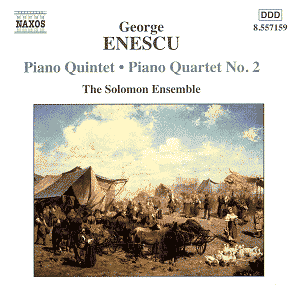Hailed in his lifetime as a virtuoso violinist,
Romanian George Enescu struggled throughout his career to become
more accepted as a composer. The early success of his Romanian
Rhapsodies boded well for the young man, but his reputation as
a soloist overshadowed his ability with the pen for the greater
part of his life. If ever there was a composer who was more deserving
of wider acclaim, Enescu is that man. The more that I hear of
his music, the more that I want to hear. His is one of the most
original and captivating voices of the late romantic and early
twentieth century periods.
A man of phenomenal musical abilities, he was
the textbook example of the complete musician. Possessed of a
photographic memory, he is said to have committed the complete
works of J.S. Bach to memory, and was able to capture complete
works on his mental ‘hard-drive’ after only one or two readings.
Heavily influenced by his time in France, the mark of Ravel and
Fauré is stamped indelibly on his work, but the gypsy yearning
and picturesque folklore of his east-European homeland is never
far from the surface. His is not music that is particularly tuneful,
and one is hard-pressed to leave whistling any particular tune
or theme. It is, however, music of tremendous atmosphere and the
palette of tonal hue is immense.
So what can one expect from this disc of mature
chamber music? Works that are as captivating as the very best
black and white photography. There are subtle variations of shadow
and light. Bold gestures stand out against a stark background;
wonders lurk in the shadows that require a certain bravery to
explore. This is chamber music in its ideal guise, every instrument
playing a vital role, but no single player monopolizing the center
stage.
And what of the playing? These are performances
of uncommon aplomb. The Solomon Ensemble gets to the heart of
these works, and these renditions are captivating from the very
first note. The listener is drawn into this recital in the way
he might expect to be captivated by a film noir. He is
afraid of the dark, but defiantly curious as to what lies under
its cloak. Perfectly balanced and breathlessly atmospheric, this
is some of the finest music making that I have heard in some time.
With the substantial number of discs that I receive, there is
little time for repeated listening. This disc has captivated my
attention for some days now and I have returned to it often, the
thrill never leaving me.
Naxos have given us yet another superbly recorded
performance, with a warm, present sound that is never harsh or
shrill. Balances between the instruments are captured beautifully,
and there is a fine bloom to the sound. Particularly pleasing
to these ears is the fact that the piano, while ever setting the
rhythmic pace, is never thunderous or overbearing. Keith Anderson
and Richard Whitehouse have composed dual sets of program notes,
which are concise and informative.
This is yet another jewel in the Naxos crown,
and if they keep up this pace, that diadem will be too heavy for
Mr. Heymann’s head.
Kevin Sutton
see also
review by Hubert Culot

